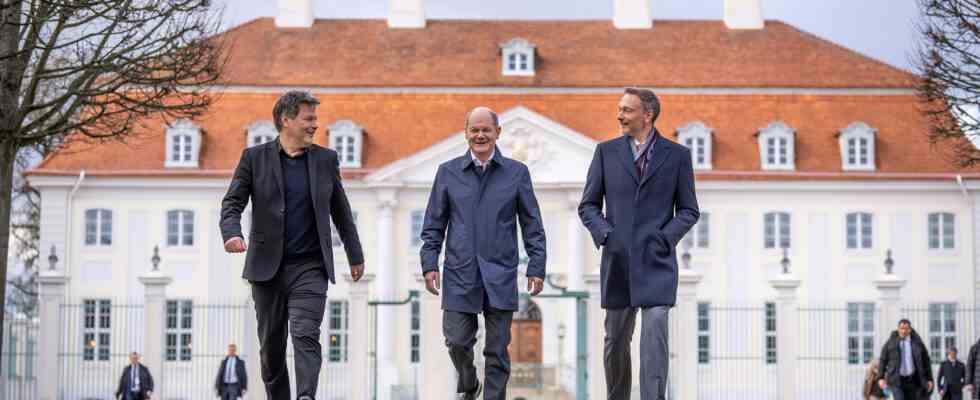Status: 06.03.2023 4:21 p.m
After the cabinet meeting, the traffic light tips draw a positive balance. Whether climate change or digitization, Germany will shoulder the challenges, promised Chancellor Scholz. About the quarrels of the past – not a word.
Talking about fundamental questions in peace – that was the goal of the two-day closed conference of the Federal Cabinet in Meseberg, Brandenburg. Afterwards, Federal Chancellor Olaf Scholz, Economics Minister Robert Habeck and Finance Minister Christian Lindner praised the “constructive talks”. The meeting in the seclusion of the baroque palace showed everyone “that we depend on each other,” said Habeck.
Matthias Deiß, ARD Berlin, on the meeting of the federal cabinet at Meseberg Castle
tagesschau24 10:00 a.m., 6.3.2023
In the past few weeks, there have been repeated heated discussions in the traffic light coalition. Now Chancellor Scholz is confident: “What has happened here is a very tangible undercut and also the common conviction that it will succeed.” Germany is facing major challenges, but has also achieved a lot since the start of the Russian war of aggression – such as not using Russian gas. “This created a new impetus,” said Scholz. The traffic light coalition now wants to complete a wide variety of projects “in a very short time”.
Energy transition will prevent unemployment
On the second day of the conference, the transformation of the economy towards climate neutrality and digitization were on the agenda. These are major tasks “that we will shoulder,” promised Scholz – and demanded speed. Four to five wind turbines would have to be built per day in order to achieve the goal of climate neutrality by 2045. In addition, the equivalent of more than 40 football fields full of solar systems would have to be built every day. According to the Climate Protection Act, emissions are to be reduced by 65 percent compared to 1990 by 2030.
The Chancellor promised that the energy transition would have a positive impact on the labor market. In the next few years Germany will leave the problem of unemployment behind. “There is a lot to do for which we need a lot of women and men who are committed here in Germany, but also come from other countries so that all the work that is required now can be done.”
Habeck wants to implement the industrial electricity price quickly
Vice Chancellor Habeck also emphasized that the challenges are enormous, but also pointed out that the number of renewable energies was 0.1 percent 23 years ago. “In fact, they didn’t exist,” says Habeck. Germany is now much further along. “So we shouldn’t be afraid of the next 20 or 25 years.” He is confident “that we will come out of the exam and solve all the questions”.
Habeck also announced that he would quickly implement a concept for an industrial electricity price in Germany. It is a competitive disadvantage that in Europe, unlike in the USA, the operating costs of production are not subsidized, said the Green politician with a view to US subsidies for climate-friendly technologies. “That’s a competitive disadvantage, you have to say that clearly.” He will therefore push a market-based solution for an industrial electricity price “very promptly”. Habeck named costs of five to nine cents for renewable energies, which should reach the companies “in full”, for example through direct contracts. “That would be part of an industrial electricity price out of the market,” he said.
Finance Minister Lindner also underlined the new impetus that arose from the talks in Meseberg Castle. “It was a good retreat,” said the minister. With regard to the disputes in the coalition, he said that there were also many opportunities for informal talks in Meseberg. “That will also help us in our day-to-day political business in Berlin.”
Artificial intelligence brings new opportunities
German industry will not only be significantly influenced by the pursuit of climate neutrality, but also by artificial intelligence. This will completely change the world, said Scholz. However, this is also associated with numerous opportunities, for example in medical research.
Finance Minister Lindner emphasized the enormous capital requirements that exist for artificial intelligence. This would also involve private capital. “It’s a good thing that we’re finalizing the Future Financing Act this week and quickly putting it in the departmental vote,” said Lindner. The law was intended to improve private financing conditions across the board.

